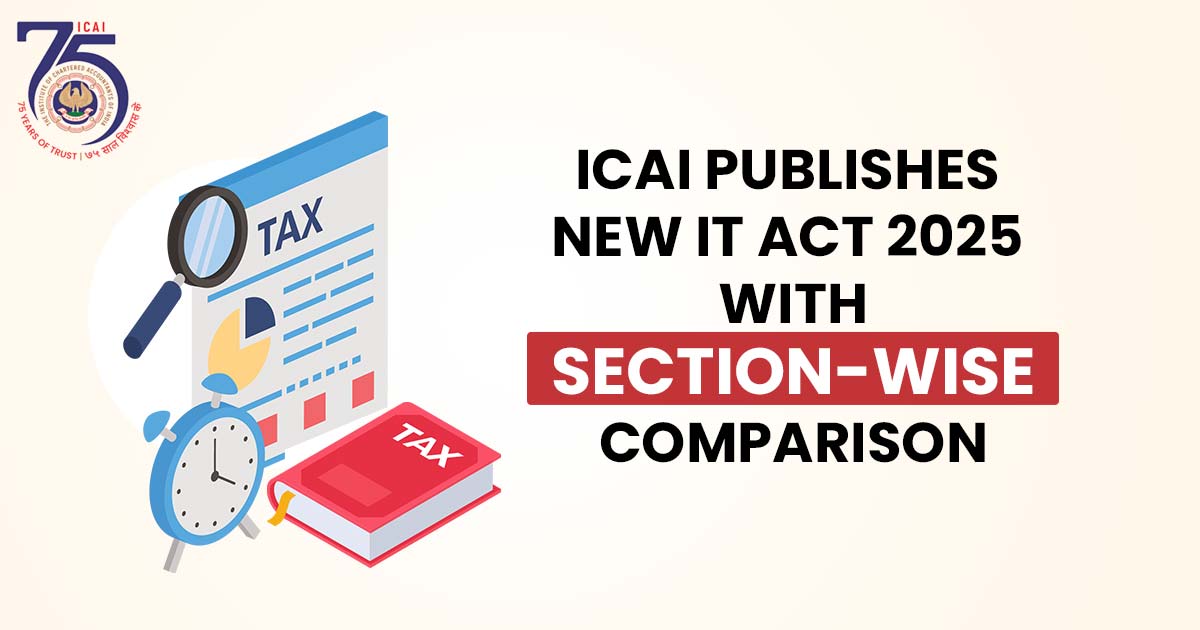
The Income Tax Act, 2025, a landmark overhaul of India’s tax legislation has been launched by the Institute of Chartered Accountants of India (ICAI), which shall come into force from April 1, 2026. Released dated 8th September 2025, this 818-page bare act, complete with a tabular mapping of sections vis-à-vis the Income-tax Act, 1961, specifies a streamlined, taxpayer-friendly approach to taxation. The publication has a cost of Rs 500, which is available to ICAI members, and this cites an influential step for easing the tax landscape of India.
A New Era of Tax Simplicity
In the 2024-25 Budget Speech, Finance Minister Nirmala Sitharaman announced that the Income Tax Act, 2025, supersedes the outdated 1961 Act with a modern framework. It lowers the total sections from 819 to 536 and lessens chapters from 47 to 23, incorporating 16 schedules and introducing tables and formulas for clearer interpretation. Some highlights are the replacement of confusing terms such as “Assessment Year” and “Previous Year” with the unified “Tax Year,” specified as the twelve-month financial period starting April 1. The Act rolls out “Virtual Digital Assets (VDAs)” to cover cryptocurrencies and tokenized assets, aligning with global digital economic trends.
A crucial role has been played by ICAI’s Direct Taxes Committee (DTC), led by Chairman CA. Piyush S. Chhajed and Vice-Chairman CA. Vishnu Kumar Agarwal. More than 90 of their recommendations, furnished via stakeholder consultations and a detailed memorandum on April 21, 2025, have been integrated into the Act. From the Gazette of India, the publication also incorporates corrigenda on September 3, 2025, ensuring precision.
Streamlined Structure and Enhanced Compliance
The act is concerned with the textual and structural simplification, removing redundant norms and adopting plain language to improve readability. It consolidates intricate sections such as those under TDS (Tax Deducted at Source) into single, navigable clauses, reducing compliance burdens. The act with no tax policy revisions preserves predictability for taxpayers while introducing a stronger dispute resolution framework. The same updated effort has been supported by the global best practices that have the motive to enhance clarity, lessen litigation and foster a digital-first enforcement environment.
ICAI, since April 2025, has held 38 outreach programs in India to provide education to professionals, with more planned to spread knowledge on the updated law. President CA. Charanjot Singh Nanda hailed the launch, citing, “This publication will empower professionals in their lifelong learning journey.”
What is its significance for taxpayers and businesses?
To enhance efficiency, transparency, and compliance with the Income Tax Act, 2025 has been made. Facilitating the language and restructuring provisions lessens the administrative costs and litigation, which makes tax filing simpler and also there will be fewer chances of errors. The inclusion of VDAs and a concentration on digital tools specifies the devotion of India to a modern tax landscape. Concerning businesses, it implies a legal framework to support growth that positions India as a global business hub.
You can click here to see or download a digital version of the Income Tax Act 2025. https://resource.cdn.icai.org/88381dtc-aps2500.pdf







